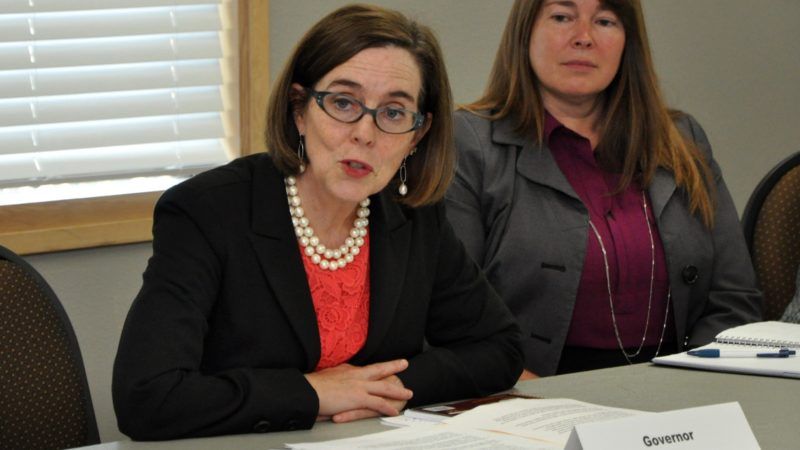A Pandemic Does Not
Suspend the Rule of Law
Courts are beginning to recognize that public health powers, while broad, are not a blank check.

Oregon Gov. Kate Brown (USDA/Flickr)
The recent court decisions overturning COVID-19 lockdowns in Wisconsin and Oregon focused on abstruse issues of statutory interpretation. But both cases also addressed a more fundamental question: Is the rule of law suspended during a public health emergency?
In response to the COVID-19 pandemic, state officials have imposed unprecedented restrictions on our liberties and livelihoods, acting on the assumption that they can do whatever they think is necessary to protect the public from a potentially deadly disease. The courts, which were initially reluctant to second-guess state responses to COVID-19, are beginning to recognize that public health powers, while broad, are not a blank check.
The Wisconsin case involved a dispute between two branches of the state government. The Republican leaders of the state legislature argued that Andrea Palm, a Democrat who runs the Wisconsin Department of Health Services, was exercising powers she had never been granted when she ordered the closure of "nonessential" businesses and confined residents to their homes except for purposes she approved, threatening violators with fines and jail.
This case was not simply a partisan spat. It raised the question of whether a single executive branch official can unilaterally criminalize heretofore legal behavior, based on nothing more than her own judgment of what is required to protect public health.
The Wisconsin Supreme Court last week concluded that Palm's order qualified as a "rule" under state law, meaning she could not legally impose it without following emergency rulemaking procedures she admittedly ignored. Those procedures, Chief Justice Patience Roggensack said in the majority opinion, provide "the ascertainable standards that hinder arbitrary or oppressive conduct by an agency," ensuring that the "controlling, subjective judgment asserted by one unelected official…is not imposed in Wisconsin."
Palm argued that her order was authorized by a statute that says her department "may authorize and implement all emergency measures necessary to control communicable diseases." But as Justice Daniel Kelly noted in a concurring opinion, that broad interpretation erases the distinction between the legislative and executive branches.
"Under our constitutional form of government, the Legislature cannot possibly have given the Secretary the authority she believes she has," Kelly wrote. "If we agreed with the Secretary's reading of [the law], we would have to conclude the statute violated the separation of powers by conferring on the Secretary the power to make laws without going through the rule-making process."
In the Oregon case, Baker County Circuit Judge Matthew Shirtcliff concluded that Gov. Kate Brown had violated the statute she cited as the authority for her business closure and state-at-home orders. Under that law, Shirtcliff said in a ruling on Monday, such orders can last no longer than 28 days.
Whether or not you agree with these decisions or the policies they overrode, the principle at stake is vitally important. Even in an emergency—especially in an emergency—government officials are bound by the law.
"If we tolerate unconstitutional government orders during an emergency, whether out of expediency or fear, we abandon the Constitution at the moment we need it most," Texas Supreme Court Justice James Blacklock observed earlier this month. "Any government that has made the grave decision to suspend the liberties of a free people during a health emergency should welcome the opportunity to demonstrate—both to its citizens and to the courts—that its chosen measures are absolutely necessary to combat a threat of overwhelming severity. The government should also be expected to demonstrate that less restrictive measures cannot adequately address the threat."
Whether COVID-19 control measures can pass that test, Blacklock suggested, depends on emerging knowledge about the epidemic. "As more becomes known about the threat and about the less restrictive, more targeted ways to respond to it," he said, "continued burdens on constitutional liberties may not survive judicial scrutiny."
I have no doubt that state officials like Palm and Brown sincerely believe they are only doing their jobs. Fortunately, judges are beginning to do theirs.
© Copyright 2020 by Creators Syndicate Inc.
